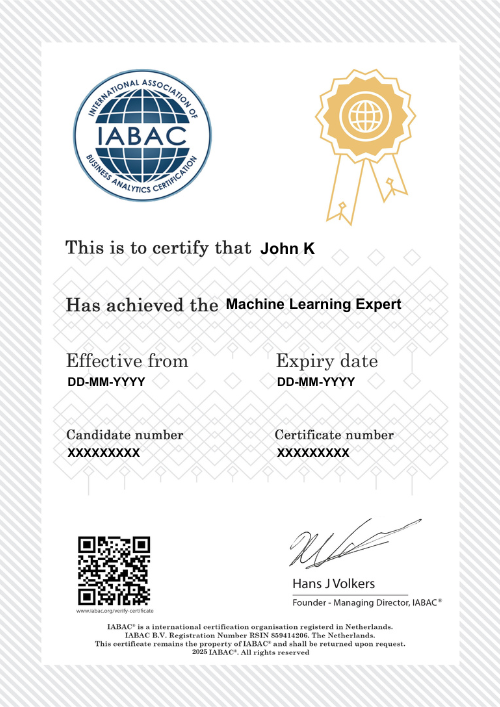Instructor Led Live Online
Self Learning + Live Mentoring
In - Person Classroom Training




The following topics are covered in "Machine Learning"
Foundation:
Machine Learning Introduction: Supervised and Unsupervised Learning
Multiple Linear Regression
Decision Tree:
Naive Bayes:
Support Vector Machines:
Association Rule:
Expert:
Neural Net:
Random Forest:
Recommendation Engine:
Dimension Reduction:
Machine Learning is a field of artificial intelligence that focuses on developing algorithms and models that enable computers to learn from and make predictions or decisions based on data, without being explicitly programmed.
The skills necessary for Machine Learning include a strong foundation in mathematics and statistics, proficiency in programming languages like Python or R, knowledge of data preprocessing and analysis techniques, familiarity with algorithms and model selection, and critical thinking and problem-solving abilities.
Commonly utilized tools in Machine Learning include programming languages like Python and R, libraries and frameworks such as TensorFlow, Keras, and scikit-learn, data visualization tools like matplotlib and seaborn, and platforms like Jupyter Notebook for development and experimentation.
The field of Machine Learning encompasses numerous distinct models, including but not limited to linear regression, logistic regression, decision trees, random forests, support vector machines, neural networks, and clustering algorithms such as K-means and hierarchical clustering.
A Machine Learning expert course typically covers topics such as statistical learning, supervised and unsupervised learning algorithms, deep learning, model evaluation and validation techniques, feature engineering, and practical application of Machine Learning to real-world problems.
Job roles related to Machine Learning include Machine Learning Engineer, Data Scientist, AI Researcher, Data Analyst, Data Engineer, and AI Consultant.
Machine learning training in India typically falls within the price range of INR 70,000 to 1,00,000.
Yes, there is a strong demand for Machine Learning professionals across various industries. With the increasing adoption of data-driven decision-making and the need for intelligent systems, the demand for skilled individuals with expertise in Machine Learning continues to grow.
The three main types of Machine Learning are supervised learning, unsupervised learning, and reinforcement learning.
Machine Learning finds applications in various domains, including but not limited to image and speech recognition, natural language processing, recommendation systems, fraud detection, autonomous vehicles, healthcare diagnostics, and financial forecasting.
KNN stands for K-Nearest Neighbors, which is a non-parametric algorithm used for both classification and regression in Machine Learning. It determines the classification or prediction based on the majority vote or averaging of the k nearest data points in the feature space.
Yes, CNN (Convolutional Neural Network) can be classified as a machine learning algorithm. CNNs are a type of neural network specifically designed for analyzing visual data, such as images, and they are widely used in various computer vision tasks.
Machine Learning has several branches or subfields, including supervised learning, unsupervised learning, reinforcement learning, deep learning, natural language processing, computer vision, and Bayesian learning, among others.
A machine learning algorithm refers to a set of mathematical and statistical techniques or procedures that enable computers to learn patterns from data and make predictions or decisions without being explicitly programmed.
The purpose behind using machine learning is to leverage the power of algorithms and statistical models to analyze and interpret complex data, uncover patterns or insights, automate tasks, make accurate predictions or decisions, and improve efficiency or performance in various domains such as business, healthcare, finance, and more.
DataMites Institute in Gandhinagar offers advantages such as experienced faculty and an industry-relevant curriculum for their Machine Learning Training Course.
The Machine Learning Training provided by DataMites in Gandhinagar is worth considering due to its comprehensive content and practical hands-on approach for effective learning.
The training program spans a duration of 5 months, allowing students a total of 400 hours dedicated to learning, including 100 hours of interactive online training.
The machine learning training fee in Gandhinagar varies based on the chosen learning mode. The available options are INR 60,000 for Live virtual training, INR 36,000 for blended learning, and INR 60,000 for on-demand classroom training.
DataMites offers a range of machine learning courses in Gandhinagar, encompassing Machine Learning Expert Training, Machine Learning Foundation Training, TensorFlow-based Machine Learning, Python-based Machine Learning Training, and R-based Machine Learning Training.
Individuals with a background in computer science, mathematics, statistics, or related fields are eligible to enrol in the Machine Learning Expert Course provided by DataMites in Gandhinagar.
DataMites in Gandhinagar offers Machine Learning courses with placement assistance, helping students secure job opportunities in the field. The DataMites Placement Assistance Team (PAT) provides services such as job connections, interview preparation, resume-building assistance, and mock interviews conducted by industry professionals.
DataMites adopts a comprehensive learning approach that incorporates theoretical knowledge, practical hands-on practice, case studies, project implementation, and model deployment, ensuring a holistic learning experience for students.
DataMites provides the Flexi-Pass option, which grants participants a 3-month duration to access training sessions. This flexible approach ensures extended support and guidance, allowing individuals to clarify doubts and review concepts as needed.
DataMites offers a complimentary demo class, giving participants an opportunity to experience a preview of the training program and gain insights into what they can expect during the actual training sessions.
Upon successfully completing the Machine Learning training, participants will be awarded the globally recognized and esteemed IABAC® certification, renowned for its industry recognition and credibility.
DataMites offers participants a range of convenient payment options, including cash, net banking, checks, debit cards, credit cards (Visa, Mastercard, American Express), and PayPal. These flexible payment methods ensure convenience for individuals enrolling in the courses.
In Gandhinagar, DataMites provides Machine Learning courses through a variety of training methods, including live virtual training, blended learning (a combination of online and classroom training), and on-demand classroom training. This diverse range of options allows learners to choose their preferred mode of learning, providing them with flexibility.
The salary of a machine learning engineer in India ranges from INR 7,77,469 per year according to a PayScale report.
The DataMites Placement Assistance Team(PAT) facilitates the aspirants in taking all the necessary steps in starting their career in Data Science. Some of the services provided by PAT are: -
The DataMites Placement Assistance Team(PAT) conducts sessions on career mentoring for the aspirants with a view of helping them realize the purpose they have to serve when they step into the corporate world. The students are guided by industry experts about the various possibilities in the Data Science career, this will help the aspirants to draw a clear picture of the career options available. Also, they will be made knowledgeable about the various obstacles they are likely to face as a fresher in the field, and how they can tackle.
No, PAT does not promise a job, but it helps the aspirants to build the required potential needed in landing a career. The aspirants can capitalize on the acquired skills, in the long run, to a successful career in Data Science.









